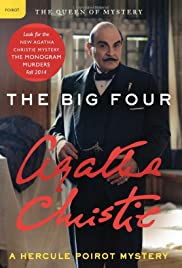
THE BIG FOUR
UK, 2013, 90 minutes, Colour.
David Suchet, Hugh Fraser, Pauline Moran, Philip Jackson, David Yelland, Tom Brooke, James Carroll Jordan, Patricia Hodge, Stephen Pacey, Simon Lowe, Sarah Parish.
Directed by Peter Lydon.
The Big Four was an earlier Agatha Christie novel, not so much a murder mystery although there are murders and mystery, but the atmosphere of espionage, the atmosphere of the impending World War II, more an adventure or a “ripping yarn�. Many readers were dissatisfied with the novel. And many fans were dissatisfied with this adaptation, once again by Mark Gattis (who wrote the Sherlock television series and portrayed Mycroft Holmes). Critics complained about his changing of the plot, the elimination of characters. Others said it was a better adaptation for the screen.
The film opens with Poirot’s death and funeral, something of a shock. However, it does offer an opportunity for his three friends to gather again, Philip Jackson as now Assistant Commissioner Japp, for Pauline Moran as Miss Lemon, and Hugh Fraser has Hastings (and the opportunity for him to say “Good Lord�).
A newspaper reporter gives information to politicians and police about a conspiracy, The Big Four. It is associated with a Chinese philosopher guru and the establishment of a Peace Party. The first murder takes place at a celebrity chess tournament, a Russian expert being killed. There is a later murder in a home after a dinner with some members of the Peace Party present, including a French scientist, Dr Olivier (Patricia Hodge). There is another murder associated with the Chinese expert, local police and Poirot investigating. There are also some scenes of an actress receiving fan cards. And an industrialist and the French doctor also disappear.
Poirot receives an invitation to a meeting and there is an explosion, Poirot presumed dead. Of course, he is alive, has followed through investigations with the actress, set up a situation to entice the mind behind the conspiracy to appear – and the revelation that it is an actor, unrequited love for the actress, creating a huge conspiracy, putting on disguises to commit his crimes. For most audiences, this may be just too far-fetched in terms of the character himself, his imagination and conspiracy, and the execution of the murders. (Many of those critical of both the novel and the film version use the word “ludicrous�.)
1. The popularity of Agatha Christie mysteries? The television series? David Suchet as Poirot? The story from an early novel but one of the last in the television series?
2. The death of Poirot, the gathering for the funeral, the funeral ceremony, the grief, the arrival of Miss Lemon, Hastings, Assistant Commissioner Japp, George? Audience disbelief?
3. The British settings, the city of London, the countryside, homes, theatre, chess championship, the theatrical finale? The musical score – and echoes of the original theme?
4. The opening, Poirot dead, the funeral? The gathering of his friends?
5. Four weeks earlier, the chess championship, the presence of Japp, meeting Poirot again? Poirot delighting in chess? Abe Ryland and his hosting? Dr Olivier and her presence and her reputation? Holding hands and the revelation of her relationship? The patronage of the Chinese Guru and the Peace Party? The Russian veteran? Play, his sudden death?
Presumed natural causes? Japp and the investigation? Poirot and his presence? Discovering the magnet in the chess piece?
6. Laurence Tysoe, journalist, his information, challenging authorities, calling out at the chess game, his removal? Meeting Poirot, the information, the messages? His informant being stabbed? His continued presence, the investigation?
7. The scenes in the theatre, Romeo and Juliet, Flossie, the cards? The reference to the Methuselah Theatre? Poirot and his investigations, the scrapbook, the photos, the seasons 1924, Flossie? His meeting with Flossie? Her going into the theatre, for the audition, the encounter with the would-be actor?
8. The Peace Party, 1938, prospects of World War II? Abe Ryland and his background, arms sales, accusations, his disappearance? Dr Olivier, at the party, the death of the host, his face burnt? The place of Dr Quinton, family physician? The tension at the party, the wife and her suspicions, the black sheep son arriving?
9. The mysterious death of Jonathan Wiley, at his home, the local police, Poirot’s investigation, the book by the Chinese guru, the Chinese statutes? Suspicion of the manservant? Out of jail, the minister helping him, his position, the boots and the bloodstains, his discovering the body, taking the statues, confessing? The maid, finding the body, explaining the events? The later revelation of the butcher and the clue from the frozen meat?
10. The disappearance of Dr Olivier? The continued focus on The Big Four? The buildup to Poirot and the explosion? His seeming death? The flashbacks and his escape from the bomb?
11. The audition, Abe Ryland and Dr Olivier frozen with the drug? The actor arriving, claiming to be number 4, the wild conspiracies in his mind, creating the conspiracy, abducting the members of the peace party, the other murders, his uncle?
12. His motivation, devotion to Flossie, unrequited love? The credibility of this motivation? The explosives? Poirot persuading him not to kill Flossie? Tysoe bringing down the curtain?
13. The happy gathering with Poirot, the opportunity to see Japp, Miss Lemon and the arrival of Hastings?
14. The story as something of an adventure, a in “ripping yarn�, rather than an Agatha Christie mystery?